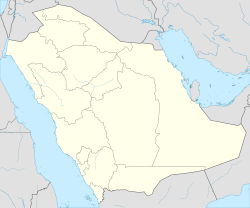
Back نيوم Arabic Neom Azerbaijani نیوم AZB नियोम Bihari নিওম Bengali/Bangla Neom Catalan نیۆم CKB Neom Czech Neom Danish Neom German
Neom
نيوم | |
|---|---|
City | |
| Coordinates: 28°07′52″N 34°55′15″E / 28.131088°N 34.920757°E | |
| Country | Saudi Arabia |
| Province | Tabuk |
| Announced | 24 October 2017 |
| Founded by | Mohammed bin Salman |
| Government | |
| • Lord Mayor | Nadhmi Al-Nasr[1] |
| Area | |
• Total | 26,500 km2 (10,200 sq mi) |
| Time zone | UTC+03 (Arabian Standard Time) |
| Website | www |
Neom (styled NEOM; Arabic: نيوم, romanized: Niyōm, Hejazi Arabic pronunciation: [nɪˈjo̞ːm]) is an urban area being built by Saudi Arabia in Tabuk Province. Launched in 2017 by crown prince Mohammad bin Salman, the site is at the northern tip of the Red Sea, due east of Egypt across the Gulf of Aqaba and south of Jordan. The total planned area of Neom is 26,500 km2 (10,200 sq mi). Multiple regions are planned, including a floating industrial complex, global trade hub, tourist resorts, and a linear city powered by renewable energy sources.[2][3] Saudi Arabia claimed that NEOM would create around 460,000 jobs and add an estimated $48 billion to the country's GDP. Thousands of people have been forcibly moved to make way for the project and villages have been razed.[4]
Much of the city is hoped to be completed by 2039,[5] though some experts have expressed skepticism about the ambitions of the megaproject.[6] The project's estimated costs exceed $1.5 trillion.[7] On 29 January 2019, the Saudi government announced that it had established a closed joint-stock company named Neom.[8] The company is wholly owned by the Public Investment Fund and is solely dedicated to developing the economic zone of Neom.[9] Saudi Arabia originally aimed to complete major parts of the project by 2020, with an expansion completed in 2025, but fell behind schedule.[10][11] By July 2022, only two buildings had been constructed, and most of the project area remained bare desert.[11] In 2024, the project was reported to have been substantially scaled back from its original plan; however, this was denied by the Saudi Economic Minister, Faisal F. Alibrahim.[12]
Neom's construction has also been criticised for environmental and human rights violations, with expatriate employees describing abusive working conditions and members of the local Howeitat tribe protesting against their forced expulsion.[13][14] Around 20,000 people are expected to be forcibly relocated.[15] Members of the Howeitat tribe have been killed resisting evictions, including Abdul Rahim al-Huwaiti who was killed by Saudi security forces under disputed circumstances.[16] Three other members of the tribe were also sentenced to death for resisting evictions.[17]
- ^ "PROFILE: Who is Nadhmi al-Nasr, the new CEO of Saudi Arabia's NEOM?". Al Arabiya English. 2018-07-03. Retrieved 2022-07-16.
- ^ Avery, Dan (26 January 2021). "Saudi Arabia Building 100-Mile-Long "Linear" City". Architectural Digest. Retrieved 2021-01-29.
- ^ Yusuf, Nadia; Abdulmohsen, Dareen (2023). "Saudi Arabia's NEOM Project as a Testing Ground for Economically Feasible Planned Cities: Case Study". Sustainability. 15 (1): 608. doi:10.3390/su15010608.
- ^ "Neom: Forces 'told to kill' to clear land for eco-city". BBC News. 2024-05-09.
- ^ Bostock, Bill. "Everything we know about Neom, a 'mega-city' project in Saudi Arabia with plans for flying cars and robot dinosaurs". Business Insider. Retrieved 2020-03-10.
- ^ "Neom: What's the green truth behind a planned eco-city in the Saudi desert?". BBC News. 2022-02-22.
- ^ Turak, Natasha (2024-04-29). "Saudi Arabia says all NEOM megaprojects will go ahead as planned despite reports of scaling back". CNBC. Retrieved 2024-05-06.
- ^ "UPDATE 1-Saudi NEOM set up as joint stock company run by state fund..." Reuters. 2019-01-29. Archived from the original on January 30, 2019. Retrieved 2019-01-29.
- ^ "Saudi Arabia announces creation of Neom Company". Arab News. 2019-01-29. Retrieved 2019-01-29.
- ^ "Saudi Arabia to Begin Building Homes in $500 Billion Futuristic City Neom". Bloomberg News. 2019-01-16. Retrieved 2020-03-10.
- ^ a b Pelham, Nicolas (28 July 2022). "MBS: despot in the desert". The Economist. ISSN 0013-0613. Retrieved 2022-07-28.
- ^ Turak, Natasha (2024-04-29). "Saudi Arabia says all NEOM megaprojects will go ahead as planned despite reports of scaling back". CNBC. Retrieved 2024-04-30.
- ^ "En Arabie saoudite, la mégalopole du futur Neom engendre déjà ses condamnés à mort" (in French). France 24. 2022-10-14. Retrieved 2024-05-09.
- ^ "Saudi Arabia: UN experts alarmed by imminent executions linked to NEOM project". Office of the United Nations High Commissioner for Human Rights. 2023-05-03.
- ^ Cite error: The named reference
:6was invoked but never defined (see the help page). - ^ Cite error: The named reference
bbc-saudi-tribe-challenges-crown-prines-planswas invoked but never defined (see the help page). - ^ Cite error: The named reference
:7was invoked but never defined (see the help page).

